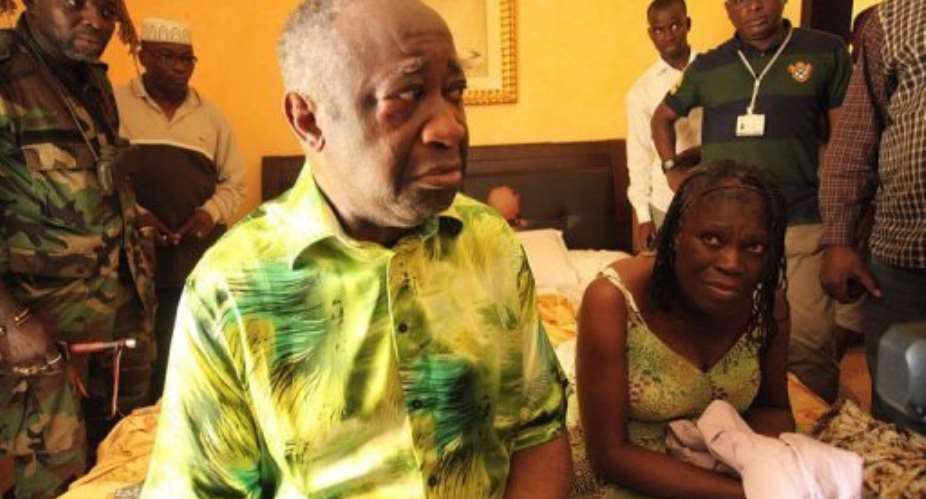THE HAGUE (AFP) - Ex-Ivorian president Laurent Gbagbo was handed over to the world court on Wednesday to face charges of crimes against humanity, the first former head of state to stand before the body.
The prosecutor at the International Criminal Court vowed that the 66-year-old would not be the only person to be brought to account over post-election violence that killed 3,000 people in the west African country.
Gbagbo was remanded in court custody early on Wednesday after flying into the Netherlands by chartered plane from Ivory Coast, where he had been under arrest since April.
"Gbagbo allegedly bears individual criminal responsibility, as indirect co-perpetrator, for four counts of crimes against humanity, namely murder, rape and other forms of sexual violence, persecution and other inhuman acts," the ICC said in a statement.
The crimes were allegedly committed between December 16, 2010 and April 12, 2011, after Gbagbo refused to step down in the wake of losing disputed presidential polls to Alassane Ouattara.
"Mr. Gbagbo is brought to account for his individual responsibility in the attacks against civilians committed by forces acting on his behalf," ICC prosecutor Luis Moreno-Ocampo said in a statement.
"Ivorian victims will see justice for massive crimes: Mr. Gbagbo is first to be brought to account, there is more to come," he said.
His first appearance is to be held "promptly", the ICC said, where his identity will be confirmed, the charges will be read against him and he'll be informed of his rights.
This was expected on Thursday or Friday, a member of the prosecutor's office told AFP.
Ivory Coast's new rulers had been pressing for weeks to have Gbagbo transferred to The Hague and the move comes less than two weeks before the December 11 legislative elections in the former French colony.
For months, since his arrest in Abidjan on April 11, he had been held in Korhogo, in the north of the country, as Ivorian investigators built a case centred around other lesser charges against him.
At home, Gbagbo faces charges for "economic crimes" allegedly committed during the political crisis and conflict triggered by his refusal to hand over power, which sparked the deadly post-election conflict.
But the ICC had launched its own investigation.
Last month, its judges allowed Moreno-Ocampo to probe alleged post-election war crimes and crimes against humanity committed by both forces loyal to Gbagbo and also to those loyal to President Ouattara.
During a visit to Abidjan on October 15, he promised an "impartial investigation" aimed at "three to six people."
Francis Dako, the African coordinator at the Coalition for the International Criminal Court pressed on the ICC to not prosecute just Gbagbo, but also those perpetrators loyal to Ouattara.
"A decision to go after the defeated president alone at this point is likely to be explosive on the ground," Dako said.
"The ICC must be prepared to explain its decision as well as to reiterate that it will continue to investigate both sides and issue arrest warrants accordingly," he said in a statement.
"Otherwise, the sense that the Court is practicing victor's justice may be overwhelming on the ground," Dako added.
In Ivory Coast the leaders of three small pro-Gbagbo parties announced they were pulling out of the December vote in protest at the transfer, which they argued would hamper national reconciliation.
But the United States said Tuesday the ex-leader had to face the consequences of his refusal to concede defeat in the 2010 presidential election.
"He now needs to be held accountable for any human rights abuses that he may have carried out," State Department deputy spokesman Mark Toner told reporters in Washington.
The Ivory Coast is the seventh African country for which a probe has been launched by the ICC since it was set up in 2002.
Others have targetted Kenya, Libya, Sudan, the Democratic Republic of Congo, the Central African Republic and Uganda.





 Saglemi Housing Project will not be left to rot – Kojo Oppong Nkrumah
Saglemi Housing Project will not be left to rot – Kojo Oppong Nkrumah
 Transport fares hike: GPRTU issue two-day ultimatum
Transport fares hike: GPRTU issue two-day ultimatum
 ARC endorses Alan as presidential candidate – Buaben Asamoa
ARC endorses Alan as presidential candidate – Buaben Asamoa
 Akufo-Addo appoints Kwasi Agyei as new Controller and Accountant-General
Akufo-Addo appoints Kwasi Agyei as new Controller and Accountant-General
 PNC dismiss reports of mass resignations
PNC dismiss reports of mass resignations
 PAC advocates for revenue collectors to be engaged on commission basis, not full...
PAC advocates for revenue collectors to be engaged on commission basis, not full...
 Genser Energy commissions 110km of natural gas pipeline at Anwomaso
Genser Energy commissions 110km of natural gas pipeline at Anwomaso
 Naa Torshie calls for tolerance, peace ahead of 2024 election
Naa Torshie calls for tolerance, peace ahead of 2024 election
 Asantehene commends Matthew Opoku Prempeh for conceiving GENSER Kumasi Pipeline ...
Asantehene commends Matthew Opoku Prempeh for conceiving GENSER Kumasi Pipeline ...
 Let’s do away with ‘slash and burn politics’ in Ghana — Dr Adutwum
Let’s do away with ‘slash and burn politics’ in Ghana — Dr Adutwum
